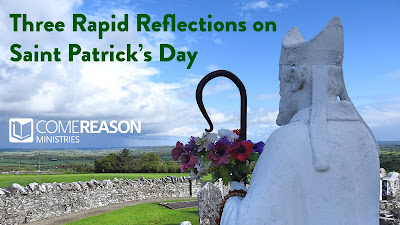Last week, I had the blessing of escaping with my wife to the giant redwoods of northern California. We stayed right in the middle of the park and I was able to ride my bicycle through the Avenue of the Giants. It was an incredible experience, being dwarfed mile after mile by some of the oldest and tallest living things on earth.
These redwoods are a testament both to God’s creative power and to the beauty he weaves into his creation. Being there is breathtaking and humbling. I marveled at his good gift to us in the experience. It is one of those things that makes life worth living. Such a statement shouldn’t be shocking, as God’s grace has that effect.
One of the great things about such a getaway is it allows one to think about the important things of life and even life itself. For example, I began to ponder “just what is it that makes life meaningful?” What does it mean to say life has meaning? We may have a natural drive to survive, but so do most animals. Seeking meaning beyond our survival is something different. It’s seeking something higher.
The Human Drive for Meaning in Life
Such questions are nothing new. Humans have always desired to find meaning both individually and within their broader existence collectively. One way we do this is to seek out meaningful experiences. By that I don’t mean experiences that make one happy or feel good. Watching a funny television show, taking a ride on a roller coaster, or getting a new hairstyle can do that but it doesn’t mean these are meaningful. Alcohol and narcotics can also make you feel good.
No, meaningful experiences are those experiences that elevate an individual. They make him or her more in touch with unique qualities that in nature only humans hold. Experiencing the truly beautiful, like the beauty of the redwoods, is one example.
All people appreciate beauty. As I’ve written before, beauty is objective. By that I mean there is a standard of beauty that sits outside of ourselves. That’s because beauty finds its ultimate fulfillment in God Himself. It is what is known as one of the transcendentals. (The two other recognized transcendentals are truth and goodness—in the sense of justice and morality). Transcendentals, as the name implies, are fundamental to being human. They transcend subcategories and are foundational to understanding value as human beings. In other words, these are the core of living a meaningful life.
Transcendentals and Elevating Humanity
The transcendentals are fundamental because they represent the highest virtues for human experience. Just having a feel-good experience, as I noted above, doesn’t make an experience meaningful. Unfortunately, today there are an awful lot of people who confuse feeling good with living a good life. They think satisfying an appetite or urge is going to make them happy. But appetites and urges are simply base instincts. They are things we share with animals. Dogs like belly rubs; snakes bask in the sunlight. All creatures want to have full stomachs and seek sex whenever and wherever they may find it. Animals are motivated by instinct, but for humans to behave this way cultivates a form of selfishness. Being human is to differentiate ourselves from animals and act in a way that is distinct, to emphasize aspects of who we are that separates us from animals.
Seeking out experiences that are grounded in truth, goodness, and beauty help us make that distinction because recognizing these things is unique to humans. Animals don’t care about beauty at all. While a female peacock might be attracted to a male with the more spectacular display of tail feathers, she is operating on an instinctual attraction, not seeing the display for its own sake. Neither of the birds would stop to ponder a richly hued sunset or the towering redwoods. We, on the other hand, see beauty for what it is in itself.
Recognizing transcendentals may be understood as something we share with God. They are part of what it means to be made in His image. God is not simply the source of all that is good; goodness finds its perfection in him as God is love. God is truth and God is beautiful.
Modern Culture’s Missing Piece
As I thought about all this, one thing I’ve realized is our culture no longer seeks to cultivate and develop truth, goodness, and beauty. We assume them then seek out the more base pleasures instead. That’s what the eruption over the U.S. abortion laws are all about. People want to feed their base nature for casual sex, but don’t want to be dealing with the natural outcome of such encounters. Yet, isn’t this animalistic? Doesn’t such a drive for immediate physical gratification rob us of expressing our uniquely human understanding that sex is good and beautiful because it bonds two people together who have committed to safeguarding the well-being of each other and any progeny that may result from that act?
What do people believe in today’s society are the things that truly makes life worth living? I’m seeing more and more people seeking an answer to that question and they cannot seem to find it. I’m beginning a project where I explore the transcendentals as not only an answer to that question, but as a way of evangelism. God is attractive because in him we can find all beauty, goodness, and truth. If people are longing for these things, I want to bring them to the source.
I will explore this topic in more detail in upcoming posts. For now, I hope that you seek out experiences in life that strengthen the Good, the True, or the Beautiful. You may just find your life has become more meaningful as a result.



